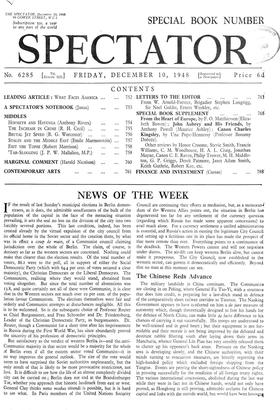NEWS OF THE WEEK TF the result of last Sunday's
municipal elections in Berlin demon- ]. strates, as it does, the admirable steadfastness of the bulk of the population of the capital in the face of the menacing situation prevailing, it sets the seal no less on the division of the city into two forcibly severed portions. This last condition, indeed, has been created already by the virtual expulsion of the city council from its official home in the Soviet sector and the creation there, by what was in effect a coup de main, of a Communist council claiming jurisdiction over the whole of Berlin. The claim, of course, is derisory so far as the western sectors are concerned. Nothing could make that clearer than the election results. Of the total number of voters, 86.2 went to the poll, all in support of either the Social Democratic Party (which with 64.4 per cent. of votes secured a clear majority), the Christian Democrats or the Liberal Democrats. The Communists, realising where they would stand, abstained from voting altogether. But since the total number of abstentions was 13.8, and quite certainly not all of these were Communist, it is clear that in the Western sectors not much over ro per cent. of the popu- lation favour Communism. The elections themselves were fair and orderly and Communist attempts at disturbances negligible. All this is to be welcomed. So is the subsequent choice of Professor Reuter as Chief Burgomaster, and Frau Schroeder and Dr. Friedensburg, Leader of the Christian Democratic Party, as burgomasters. Dr. Reuter, though a Communist for a short time after his imprisonment in Russia during the First World War, has since abundantly proved the sincerity of his profession of democratic principles.
But satisfactory as the verdict of western Berlin is—and the.anti- Communist majority in that sector would be a majority for the whole of Berlin even if all the eastern sector voted Communist—it in no way improves the general outlook. The size of the vote would seem to have surprised the Soviet authorities unpleasantly, but the only result of that is likely to be more provocative restrictions, not less. It is difficult to see how the life of an almost completely divided city can be carried on ; Berlin does not end at the Brandenburger Tor, whether you approach that historic landmark from east or west. General Clay thinks some modus vivendi is possible, but it is hard to see what. In Paris members of the United Nations Security Council are continuing their efforts at mediation, but, as a memoran.4, dum of th" Western Allies points out, the situation in Berlin has degenerated too far for any settlement of the currency question (regarding which Russia has made some apparent concessions) to avail much alone. For a currency settlement a unified administration is essential, and Russia's action in ousting the legitimate City Council and setting up a fictitious one in its place has made the prospect of that more remote than ever. Everything points to a continuance of the deadlock. The Western Powers cannot and will not negotiate under duress. The air-lift can keep western Berlin alive, but cannot make it prosperous. The City Council, now established in the western sector, can govern it democratically and efficiently. Beyond that no man at this moment can see.














































